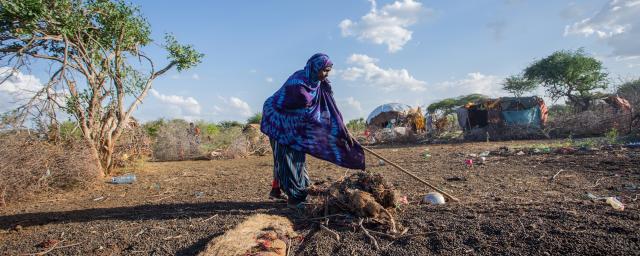
Pastoralist Fatuma pictured outside of her home in Tana River County, Kenya. Before the 2020 locust infestation, Fatuma’s household was stable. But then the locust came and ate all of her livestock’s pastureland. This was followed by an intense drought, causing the animals to grow weak and migrate in search of greener pastures. Photo: Lameck Ododo/Oxfam
I was born and raised in Karamoja 24 years ago. Since then, the World Food Programme has been giving us food rations monthly. Other development partners have been giving us cash vouchers and yet we owned lots of cattle.
For 3 years, I have witnessed droughts hitting our community, leading to the loss of livestock which is the backbone of the Karimojong people. The droughts also destroyed the vegetation and the few crops our parents could plant.
Amidst the drought challenges, my father managed to educate me up to form 6, but I could not proceed as he was struggling to push my siblings to the same level of education.

The situation is even worse in many families, including my relatives whose livelihoods have been in dire need for decades as drought ravages the Karamoja area now almost every year, affecting livestock and small-scale food production.
This has escalated poverty in the region and driven youth, women, and children to resort to charcoal burning from the very few still-surviving trees for sale to support their families. Now, Karamoja, my homeland, is nearly a desert.
Many young people and women who have found the situation very hard for them to withstand have now migrated to towns around the East Africa (Kampala, Nairobi and a few pockets in Tanzania’s Dare Salam and Somaliland). My people are now beggars on streets in these cities and young girls have turned to prostitution as a means of survival.
“Climate change is no longer some far-off problem”
With the effects of climate change I read in the news and Intergovernmental Panel on Climate Change scientific reports, the situation in Karamoja is heading for worse moments of climate change impacts. As a way of survival, agriculture is not yielding any good results every season. Karimojong young boys have resumed their past behaviours of cattle theft as a means of survival and in the end, we have lost (and are still losing) lives of some of these young people.
With lack of serious interventions on ensuring sustainable food for Karamoja I wonder for how long will the Karamoja people depend on food aid? For how long will the Karimojong women and girls remain on the streets of these cities as beggars and prostitutes? Something must be done. Something must be done today and now.
The former president of the United States of America said, “Climate change is no longer some far-off problem; it’s happening here and happening now” and I am therefore calling of the world leaders to consider ambitious actions on reducing their emissions and increasing funding to adaptation activities in the developing countries as they are innocently affected by actions of the developed world. Maybe Karamoja can see some light at the end of the tunnel.